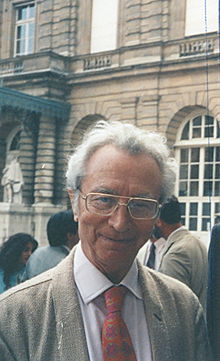- Mattei Dogan
-
Mattei Dogan (1920 - 2010) is a French political sociologist and senior research officer emeritus of the French National Center for Scientific Research (CNRS)[1] and professor emeritus of political science of the University of California, Los Angeles.[2] Over a period of 22 years, he has also taught at UCLA, Indiana University, Yale University, the Institute of Statistical Mathematics in Tokyo, the University of Florence, and, most recently, the Russian Academy of Sciences. He is a foreign member of the Romanian Academy[3], and he has received the silver medal from CNRS.
He has chaired the Research Committee on Political Elites of the International Political Science Association (IPSA) and the Research Committee on Comparative Sociology of the International Sociological Association (ISA)[4]. He is also the founder of the Foundation Mattei Dogan[5] that is devoted exclusively to the social sciences, and which is recognized as a non-profit organization by both the French and American governments.
His main research domains include elite studies, international comparative analysis, and interdisciplinary approaches. His publications have dealt with the relationship between political behavior and religious behavior, political legitimacy and the ruling class. He has also worked on the society and political regime of Italy.
His professional itinerary is marked by his affiliation with the Committee on Political Sociology (ISA and IPSA)[6], which played a pioneering role in comparative research and where he was in the company of scholars like Giovanni Sartori, Seymour Martin Lipset, Stein Rokkan, Richard Rose, Juan Linz, and other comparativists. During his long career, which spans more than a half-century, he has moved from empirical research on topics like voter behavior to more encompassing theoretical work, his most recent publication being Is There A Ruling Class in France?.
References
External links
- Website of the Foundation Mattei Dogan[1]
Categories:- French sociologists
Wikimedia Foundation. 2010.

